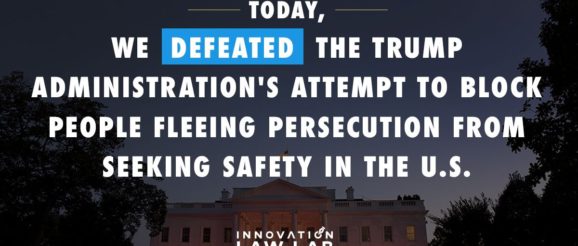Federal Judge Blocks Implementation Of The Trump Administration’s Asylum Transit Ban | Innovation Law Lab

Federal Judge Blocks Implementation Of The Trump Administration’s Asylum Transit Ban
FOR IMMEDIATE RELEASE
Wednesday, July 24, 2019
San Francisco, CA 一 Today, a federal judge issued a nationwide injunction preventing the Trump Administration from categorically denying asylum to people fleeing persecution who arrive at the U.S. southern border. The court found that the government’s new rule — the so-called asylum transit ban — would “categorically deny asylum to almost anyone entering the United States at the southern border”. Rejecting all of the administration’s major arguments, the court found that Innovation Law Lab, East Bay Sanctuary Covenant, Al Otro Lado, and CARECEN “are likely to succeed on the merits of their claim that the Rule is substantively invalid.”
“We are grateful that the court has prevented this arbitrary and capricious new rule,” said Stephen W. Manning, Director at Innovation Law Lab. “Not only was the rule unlawful, it was an immoral attempt to push people fleeing persecution back into harm’s way.” Innovation Law Lab is a nonprofit organization that harnesses the power of technology and lawyers to defend persons fleeing persecution through its asylum defense projects in places such as California, Oregon, Tijuana, New Mexico, Georgia, Texas, and Missouri.
In a powerfully worded opinion, the federal court held that the government’s new rule was “antithetical” to the asylum statute and “unmoored from the purposes and concerns” of the asylum statute. The Trump administration had argued that the new rule was lawful because it would not put individuals into danger and was consistent with the asylum statute. The court rejected these arguments. The court found that the organizations — Innovation Law Lab, East Bay Sanctuary Covenant, Al Otro Lado, and CARECEN — would suffer harm if the rule were allowed to be implemented. The court reasoned that the asylum transit ban was inconsistent with the design and structure of the asylum statute. The new rule “does virtually nothing to ensure that a third country is a ‘safe option’” and that the government’s own records demonstrate “abundantly why Mexico is not a safe option for many refugees[.]”
The court analyzed the government’s rule against the overwhelming evidence — submitted by the Trump administration itself — that, in the court’s words documented “in exhaustive detail the ways in which those seeking asylum in Mexico are (1) subject to violence and abuse from third parties and government officials, (2) denied their rights under Mexican and international law, and (3) wrongly returned to countries from which they fled persecution.” Notably, the court recognized that “even though this mountain of evidence points one way, the agencies went the other — with no explanation.”
“This ruling is a decision that supports the rule of law and allows the United States to continue fulfilling its humanitarian responsibilities,” said Ramon Valdez, Director of Strategic Initiatives at Innovation Law Lab. “People fleeing persecution should not be returned to horrific violence.” The court today restored order to the orderly processing of applicants for asylum, Valdez explained. “Thanks to this decision, tomorrow, we can continue with our nation’s important work of respecting the right of refuge and welcoming families and children fleeing violence to safety.”
